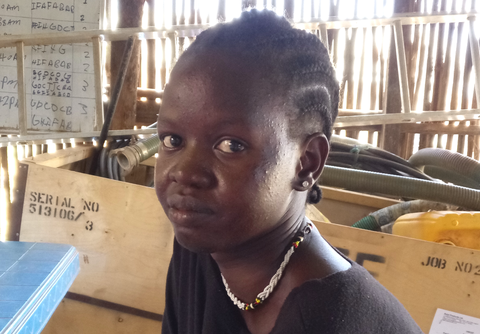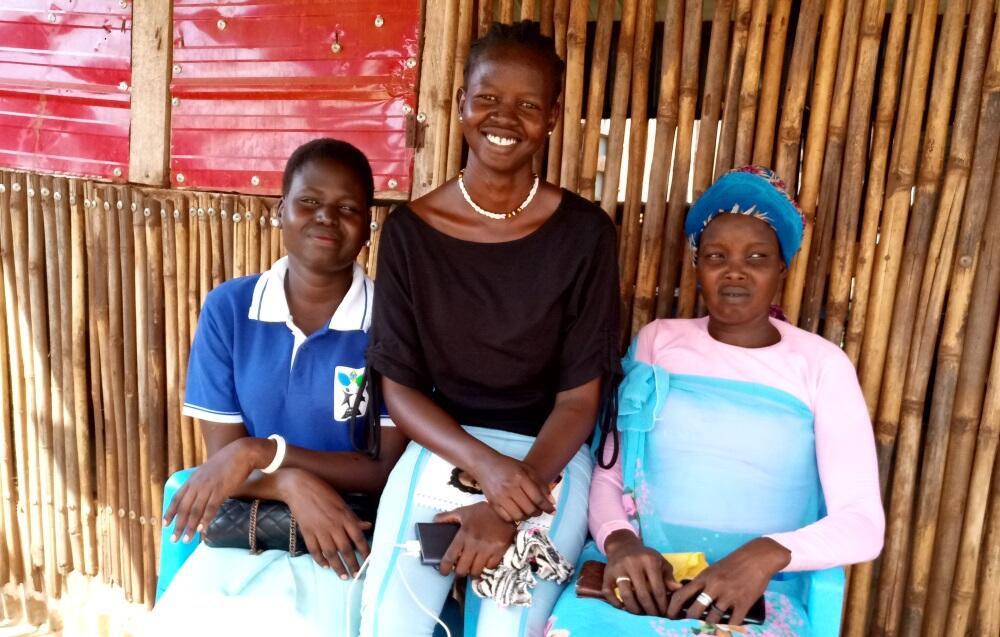JUBA, South Sudan—“My periods are a nightmare as they are very painful, and I can’t get [access to] any sanitary products.”
For millions of women and girls displaced by conflict and natural disasters in Africa, adequate hygiene facilities and privacy during menstruation are rare. Nyanjuma Gatloth, 20, is one of them.
As she describes her monthly ordeal with menstruation, she recalls how her life, and that of her family of seven, has changed since they fled Bentiu, the capital of Northern Liech state. They have taken shelter in one of the United Nations Protection of Civilian sites (PoC) in Juba. PoC sites are settlements within the United Nations premises in which civilians seek protection and refuge when fighting breaks out in surrounding communities.
Living in a PoC is difficult, as we depend on food handouts from humanitarian actors.
“Living in a PoC is difficult, as we depend on food handouts from humanitarian actors,” says Ms. Gatloth.
She had her first period in 2013, at the age of 15. This was also the year the current conflict began in South Sudan between the government and opposition forces, just two years after the country gained independence from Sudan in 2011.

the current conflict began in South Sudan between the government
and opposition forces. © UNFPA South Sudan/Juma Delu
The conflict has had a devastating impact on the human population. Thousands have been killed or wounded, a large part of the country’s infrastructure has been destroyed, livelihoods have been lost, and basic health services have been disrupted.
As many as four million people have been displaced and seven million are in need of humanitarian assistance.
The situation has been compounded by a severe economic crisis and continued depletion of resources; affected families in the country are reported to be surviving on yam and wild fruit.[1]
Ms. Gatloth believes that without the support of her mother, who helped her through the process of managing her first menstruation, she would have found it impossible to continue attending school.
I have managed to go through primary and secondary [school] because she supported me and taught me that I should never be ashamed about having my periods.
“I have managed to go through primary and secondary [school] because she supported me and taught me that I should never be ashamed about having my periods,” she says.
Managing menstrual hygiene
Menstruation is a biological process that about half of the world’s population experiences for a significant proportion of their lifetime. To manage their menstrual hygiene adequately, women and adolescent girls need clean menstrual material to absorb or collect the menstrual blood.
They need to be able to change the absorbent material in private and as often as necessary for the duration of the menstrual cycle, using soap and water for washing the body as required. They should also have access to facilities to dispose of used menstrual management materials.
When she was at school, Ms. Gatloth and her friends received free sanitary pads from a non-governmental organization (NGO) working in the area.
The South Sudanese NGO Health Support Organization-THESO supplies schoolgirls with reusable sanitary pads twice a year, as part of their emergency reproductive health services.
“I would wash my pads and put them to dry for reuse,” says Ms. Gatloth. But once she had completed her primary and secondary school education, the situation changed for the worse.
“Besides the pain that I have to try and manage, I can’t get any sanitary products to use,” she says. As a result, her period has become like “a terrible sickness”.
[On] the days that I am lucky, I get a few sanitary pads from my friends, while other days I end up using rags to absorb the blood flow.
“[On] the days that I am lucky, I get a few sanitary pads from my friends, while other days I end up using rags to absorb the blood flow.”
She washes herself inside her small hut made of tarpaulin, and disposes of the used pads or cloths by wrapping them in a polythene bag and dumping them in a pit latrine.
“I was dreaming of becoming a pilot”
Today, Ms. Gatloth feels far removed from the future she hoped for. Her parents cannot afford to send her to university in another country to achieve her dream career.
“It bothers me a lot as the future looks bleak. I was dreaming of becoming a pilot but the crisis killed it,” she says.
With the signing of the recent peace agreement in South Sudan, she hopes to return one day to her home in Bentiu – but for now, she remains sceptical: “For us, even going back home and settling is very difficult as we lost everything. Everything was taken [from us],” she says.
For now, she feels safe and secure in the PoC, a place she calls home – but a home far from home, nonetheless.
- Juma Delu with additional input from Aimee Manimani Nsimire
[1] https://radiotamazuj.org/en/news/article/over-7-000-people-urgently-nee…


